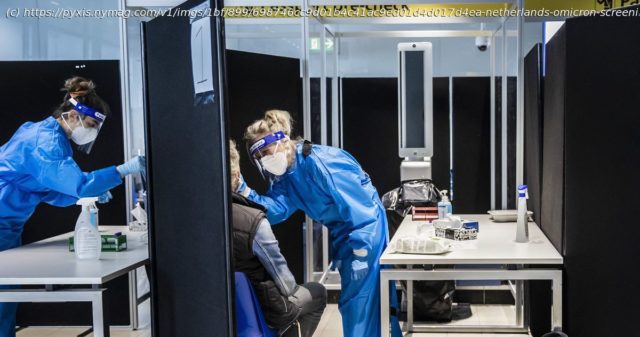Scientists say the variant, which has been spreading in South Africa and Botswana and has already prompted numerous travel bans, has a worrisome number of mutations — but more research is needed.
A worrisome new COVID-19 variant recently identified in southern Africa has been officially designated a “variant of concern” by the World Health Organization. Cases of the variant have been detected in dozens of countries, and it has quickly become the dominant variant in South Africa. Numerous countries including the U.S. have restricted travel from countries in southern Africa in an attempt to slow the variant’s spread, but cases continue to turn up around the world regardless. Scientists in South Africa and elsewhere are working as fast as they can to determine whether Omicron may or may not be more dangerous compared with other variants, like Delta. As with any new variant, that means determining whether or not Omicron, which has an unusually high number of mutations, is more easily transmissible, better able to evade COVID treatments and natural or vaccine-induced immunity, or might cause more severe disease. In the meantime, below is what we do and don’t know about the new variant.. The most recent major developments regarding Omicron are below. A growing number of states have reported cases of Omicron as U.S. scientists continue to search for where the new variant has spread. Some of the several dozen detected cases have no known link to travel abroad, suggesting there is likely community spread within the U.S. On Sunday, CDC Director Rochelle Walensky said the number of cases is likely to rise — though to be clear, nearly all sequenced cases of COVID-19 in the country continue to be from the Delta variant. Thus far, the states that have confirmed cases among their residents include California, Colorado, Connecticut, Georgia, Hawaii, Louisiana, Maryland, Massachusetts, Minnesota, Missouri, Nebraska, New Jersey, New York, Pennsylvania, Utah, Washington and Wisconsin. Internationally, cases have been detected in well over 40 countries, including indications of community spread (cases that aren’t connected to travel) in at least 18 countries, including South Africa, Botswana, Zambia, Zimbabwe, Australia, Belgium, Britain, Canada, Denmark, Germany, Iceland, India, Israel, Norway, Portugal, Spain, the U.K., and the U.S. As of Sunday, at least 246 cases have been detected in the U.K. and 183 in Denmark, two countries which are among the world leaders in COVID testing. As Intelligencer’s Matt Stieb highlighted on Sunday: Just as concerns about the rise of the still-spreading Delta variant boosted vaccination rates earlier this year, uncertainty over Omicron has caused a significant increase in Americans signing up for a shot. On Thursday, the U.S. recorded 2.18 million shots — the “highest single-day total” of vaccinations since May, according to the White House — as the weekly average of doses administered was 22 percent higher than the week prior. Per the Wall Street Journal, the FDA is talking with vaccine makers and working on ways to speed up authorization for modified COVID vaccines in case Omicron is better able to evade the protection provided by current vaccines. According to new research published Friday, the new variant has been spreading in South Africa at more than the double the speed of the Delta variant — though it’s not yet clear precisely why. Per the New York Times: The variant was first identified in South Africa on Nov.23 and has quickly come to account for about three-quarters of new cases in the country. The country reported 11,535 new coronavirus cases on Thursday, a 35 percent jump from the day before, and the proportion of positive test results increased to 22.4 percent from 16.5 percent. Omicron cases are doubling roughly every three days, the researchers said on Friday. In a briefing held this week by the World Health Organization’s Africa branch, scientists from South Africa presented a paper — which has not yet been peer-reviewed, nor published in a scientific journal —suggesting that previous infections do not have much effect in stopping transmission of the virus. To prepare for the spread of Omicron in the United States, President Joe Biden announced a free, at-home testing program on Thursday, in which privately-insured Americans would be covered for tests and the 150 million Americans without private insurance would be reimbursed for their purchases. Biden also announced new vaccination sites focused on families, a push for boosters for all Americans over 18, and additional testing requirements for international travelers, who must now show a negative test from the 24 hours before their flight. “We’re going to fight this variant with science and speed, not chaos and confusion,” he said at the National Institutes of Health. Reimbursement for at-home tests is not expected to be ready until January 15, when federal regulators are expected to tell insurers to pay for tests purchased for home use. Reimbursement will not be retroactive either.. Research is still underway to determine the real-world differences between Omicron and other variants. As of now, the most concerning difference between Omicron and other known variants is that it has a “very unusual constellation of mutations,” according to Tulio de Oliveira, the director of South Africa’s Centre for Epidemic Response and Innovation. Those roughly 50 mutations of note include over 30 on the virus’s spike protein, including ten mutations on a key protein (the ACE2 receptor) that helps the virus infect humans — whereas the Delta variant has two mutations on the ACE2 receptor, and the Beta variant has three. Quite striking the amount of red (mutations) on omicron compare to delta… pic.twitter.com/fcJimJCNK5 The high number of mutations, relative to other variants, does not necessarily mean Omicron is more transmissible or better able to evade immune responses (like the protection induced by vaccines) than other variants. But Omicron’s mutations — which include ones that scientists haven’t seen before as well as ones they have — suggest it might be. “If we were looking out for mutations that do affect transmissibility, it’s got all of them,” University of Oxford evolutionary biologist Aris Katzourakis told Science. On Saturday, Brown University’s School of Public Health dean, Ashish Jha, said he thought “the more likely scenario is that Omicron does spread more easily than Delta.” That would also explain why early data suggests Omicron has been able to outcompete Delta in South Africa. When World Health Organization advisers designated Omicron a “variant of concern,” the organization pointed to its “large number of mutations” as well as how “preliminary evidence suggests an increased risk of reinfection” with the variant.






